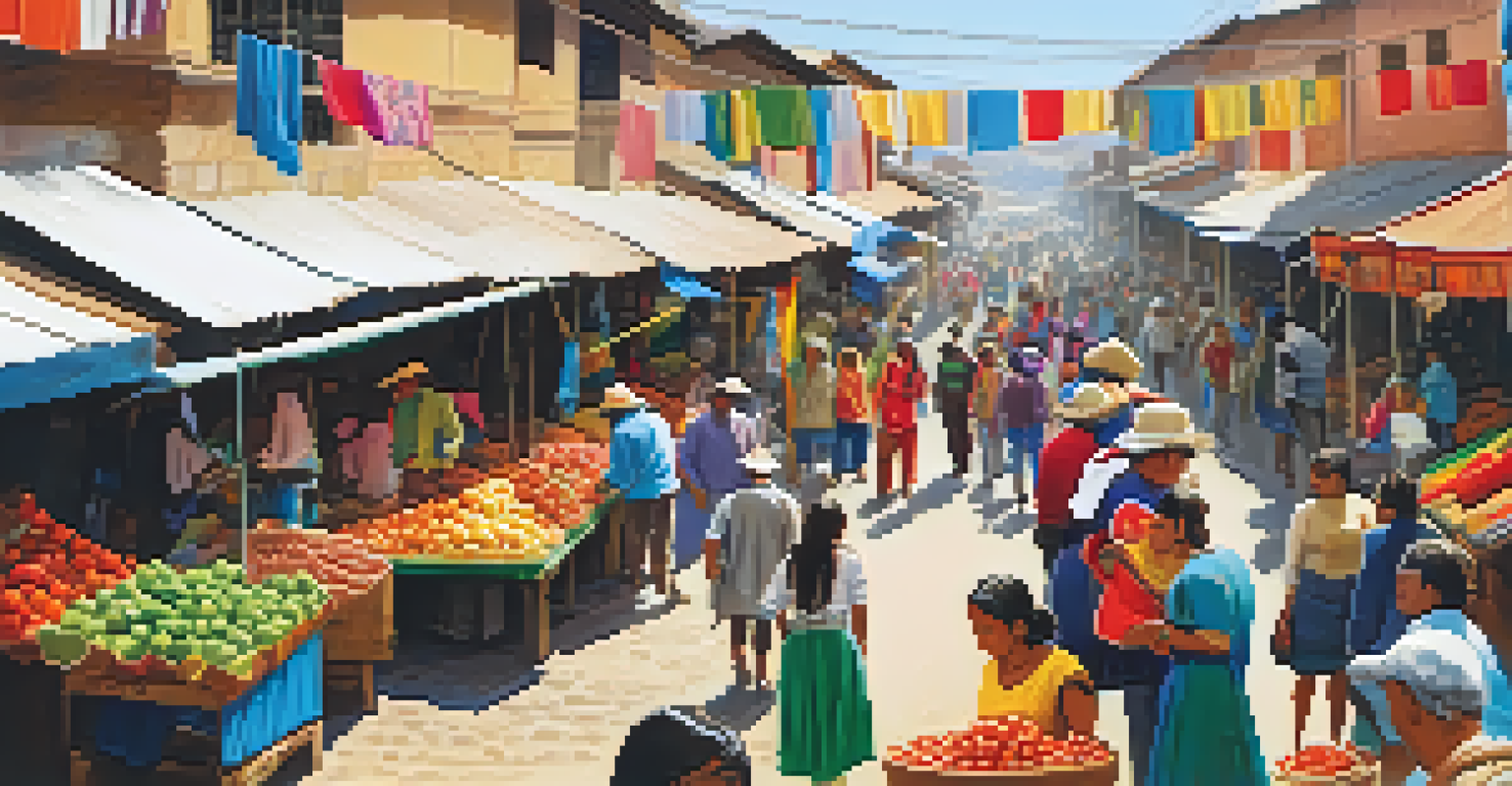Exploring the Legacy of Mario Vargas Llosa in Peruvian Literature

Introduction to Mario Vargas Llosa's Influence
Mario Vargas Llosa, a towering figure in Peruvian literature, has profoundly shaped the literary landscape of his country. His works delve into the complexities of identity, politics, and society, resonating with readers across generations. As a Nobel Prize winner, his influence extends beyond Peru, making him a global literary icon.
Literature is a weapon in the fight for freedom and justice.
Born in 1936 in Arequipa, Vargas Llosa's journey as a writer began early, showcasing his passion for storytelling. His unique blend of narrative techniques and deep social commentary has set a standard for contemporary writers. This introduction serves as a gateway to understanding his lasting legacy.
In this article, we'll explore various aspects of Vargas Llosa's literary contributions, examining how his works reflect and challenge the socio-political realities of Peru. From his early novels to his later essays, each piece offers insight into the heart of Peruvian culture.
Vargas Llosa's Early Works and Themes
Vargas Llosa's early novels, like 'The Time of the Hero' and 'The Green House,' laid the foundation for his literary career. These works often explore themes of power, corruption, and the struggle for identity, reflecting the tumultuous environment of mid-20th century Peru. His ability to weave intricate narratives with rich character development is evident from the start.

In 'The Time of the Hero,' Vargas Llosa critiques the rigid structure of Peruvian society through the lens of a military academy. This novel not only showcases his narrative talent but also highlights the psychological conflicts of his characters. Each story serves as a mirror, reflecting the societal issues faced by Peruvians.
Vargas Llosa's Political Engagement
His works provoke thought on significant political issues, challenging authority and encouraging social critique.
The recurring themes in his early works resonate with readers, prompting them to reflect on their own experiences. Vargas Llosa's exploration of personal and political turmoil invites a deeper understanding of the human condition, making his literature timeless.
The Political Engagement in Vargas Llosa's Writing
One defining characteristic of Vargas Llosa's work is his political engagement. His novels often tackle significant political issues, challenging the status quo and provoking thought among readers. For instance, 'Conversation in the Cathedral' delves into the complexities of dictatorship, showcasing the struggles of individuals in a repressive system.
The writer's job is to make sense of the world and show the truth of human experience.
Through his narratives, Vargas Llosa encourages readers to question authority and consider the implications of political choices. His bold approach not only entertains but also educates, making literature a powerful tool for social critique. This commitment to political discourse reinforces his role as a writer who is deeply invested in his country's future.
Vargas Llosa's engagement with politics extends beyond fiction; he is also an outspoken public intellectual. His essays and articles often reflect his views on democracy, freedom, and human rights, further solidifying his influence in both literary and political spheres.
Vargas Llosa's Narrative Techniques and Style
Another aspect of Vargas Llosa's legacy is his innovative narrative style. He employs various techniques, such as non-linear storytelling and multiple perspectives, to enrich his narratives. This complexity invites readers to engage actively with the text, piecing together the storyline like a puzzle.
For example, in 'The Feast of the Goat,' he uses a fragmented structure to explore the inner workings of a dictatorship. This technique immerses readers in the chaotic reality of the characters, enhancing the emotional impact of the story. Vargas Llosa's mastery of narrative form has inspired countless writers to experiment with their own storytelling methods.
Innovative Narrative Techniques
Vargas Llosa employs non-linear storytelling and multiple perspectives, enriching his narratives and engaging readers.
His distinctive style not only captivates readers but also contributes to the broader evolution of Latin American literature. By pushing the boundaries of conventional storytelling, Vargas Llosa has paved the way for future generations of writers to explore new narrative possibilities.
Cultural Reflections in Vargas Llosa's Works
Vargas Llosa's literature often serves as a reflection of Peruvian culture, capturing the nuances of its history and traditions. His works explore the complexities of identity in a country marked by diversity and conflict. Through his characters and plots, he highlights the rich tapestry of Peruvian life.
In 'The Bad Girl,' for instance, he examines themes of love and betrayal against the backdrop of political upheaval. By intertwining personal stories with broader cultural contexts, Vargas Llosa invites readers to consider how individual lives are shaped by societal forces. This connection between the personal and the political is a hallmark of his writing.
Moreover, his exploration of cultural identity resonates with readers beyond Peru, as many grapple with similar issues in their own societies. Vargas Llosa's ability to articulate complex cultural dynamics makes his work universally relevant, fostering a deeper understanding of human experiences.
Vargas Llosa's Role as a Literary Mentor
Throughout his career, Vargas Llosa has played a significant role as a mentor to emerging writers. He has been instrumental in nurturing new talent in Peru, providing guidance and support to those who aspire to follow in his footsteps. This commitment to fostering creativity reflects his belief in the power of literature to effect change.
His involvement in literary workshops and educational programs has helped cultivate a vibrant writing community in Peru. By sharing his insights and experiences, Vargas Llosa empowers young writers to explore their voices and tackle important themes in their work. This mentorship is a testament to his dedication to the literary arts.
Cultural Reflections in Literature
His literature captures the complexities of Peruvian identity and culture, making it universally relevant to diverse audiences.
Vargas Llosa's legacy is not only defined by his own works but also by the impact he has had on future generations of writers. His encouragement and advocacy for literature ensure that the rich tradition of Peruvian storytelling continues to thrive.
Vargas Llosa's Continued Relevance in Modern Literature
Even in the contemporary literary landscape, Vargas Llosa's influence remains strong. His ability to address timeless themes of power, identity, and social justice resonates with today's readers. As new generations grapple with similar issues, his works continue to provide valuable perspectives.
Moreover, Vargas Llosa's exploration of the human experience transcends cultural boundaries, making his literature accessible to a global audience. This universality ensures that his stories remain relevant, prompting discussions about morality, politics, and personal relationships.

As we look to the future, Vargas Llosa's contributions to literature will undoubtedly continue to inspire writers and readers alike. His legacy serves as a reminder of the transformative power of storytelling, encouraging us to reflect on our own narratives within the broader context of society.